BLOG POST BY LISA CARMACK: We live together, We learn together
On this episode of Lisa Writes Home, you will read about:
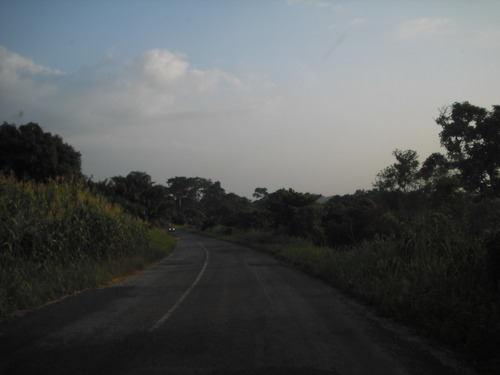
And so the journey has begun. I’ve sent out group emails, recorded more audio than I can ever synthesize into stories (though that won’t stop me from trying— Transom, where you at?), hiked through the North, braved the bustling and aromatic streets of the Madina Market, visited schools, learned the special snappy handshake (video tutorial to come), experienced my first political protest (the Supreme Court verdict on the questionable election results) and finally started classes.
The road is long and it has just begun but I’m relishing in the experience, drinking in each moment and insatiably seeking out the next adventure. I can feel the gravity that this place has on me, it’s a deep aching tug on my heart that feels like meeting an old friend for the first time in many years. I’ve built friendships with Ghanaians that I know will last forever despite distance or time.
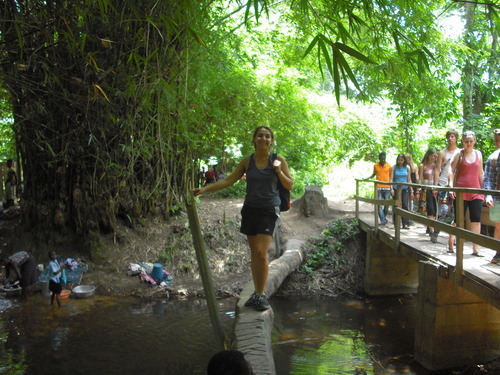
Photo: Hiking up to the Wli Waterfalls in the Volta region.
Acclimating and communicating:
Here are a few of the things I’ve heard from people back home both before and after departure to Ghana that are either unsettling or sound plain absurd upon arriving here.
First: I’m safe. It’s very safe here. I have never worried about getting robbed, singled out (other than for marriage proposals), harassed or really harmed in any way. This is mostly because I take basic precautions like not being out alone in the middle of the night, making sure I’m with people I trust, being assertive about saying no (really, don’t be shy if you’re not comfortable) and being conscious of where my bag/money is. These are basic precautions for anywhere that you live. Crime and theft is looked down upon here and if someone tries to steal something and are caught, they’re usually pretty severely beaten by store owners, pedestrians, mothers, old ladies with canes etc. until the police come to save them. That’s right, a thief would rather be in jail than be caught on the street. The idea that I, a pedestrian/student should buy an Uzi and strap it to my back is and would be laughable. I’m sure many people would openly poke fun at my paranoia. So I’m not scared, nor have I ever been during my time here (honest!) and I am very happy.
Second: The tan skinny thing just feels a little strange for a few reasons. Those who subscribe to the Vogue/Seventeen magazine, popular culture, American idea of beauty— either consciously or subconsciously— are likely to cook up this odd compliment/prediction because it’s the only thing they can think of to be excited for me about (deep breath) BECAUSE they don’t know much about Africa or Ghana. Ghanaians would laugh the way an African American would laugh if the subject of tanning came up. It’s like discussing the weather, “It’s hot out today, the sun is shining..” Well, DUH!! I’m in Sub Saharan Africa! It’s hot! So yes, as an obruni (foreigner) my skin will get a little darker, but there’s no real social significance to that. Even if I were Latina, Chinese, Lebanese or Thai, I’d still be considered a white person here. It’s just the way things are. There’s also nothing special about being skinny— UNLESS you’re a model. That’s the only instance I’ve heard of it being discussed. Being larger or being called “fat” is actually a compliment. It’s a good thing here. The UC program coordinator, Dr. Rose Walls mentioned specifically that “all shapes and sizes are accepted here.” It’s really a beautiful thing, actually. Things that DO matter aesthetically: hair. Is it braided? Relaxed? Straightened? Curled? Long? Short? Do you have extensions? Did you add color? Honestly I’m tempted to try the braids just out of curiosity, but obrunis with braids are kind of laughable. It would be like if the first thing I’d done here was start wearing all rasta colors, dread my hair and start calling everyone Jah Spirit. Rasta is a big deal here for some and it’s kind of a hyperbolized example of “trying too hard” to fit in.
Clothing and style is also a big deal here. Everyone with the means dresses to the NINES out here. Beautiful, vibrant colors, traditional dresses, scarves, jewelry, shoes— holy crap why do people tell you NOT to bring nice clothes here? The club scene is especially striking. Platform heels, bottle service, tight tube dresses and other fashionable items that would put most of San Francisco clubs to shame. Why does no one talk about this?? Stigmas are an issue!
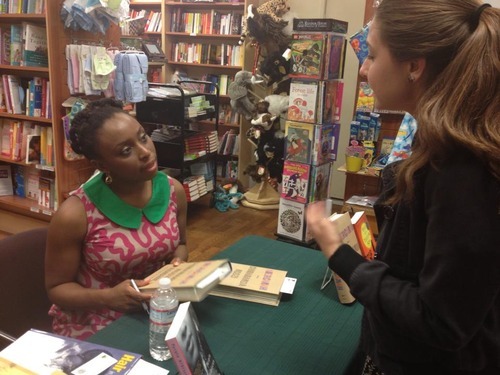
By the way, here’s a picture of me with Chimamanda Ngozi Adichie— I just started her newest book (the one she’s signing for me) Americanah and it’s ROCKING MY WORLD. I love her. Read her books. Yes I am shamelessly promoting her.
There’s been an ongoing debate on what constitutes a “developed” nation. In America, it’s technology, government infrastructure, efficiency and accessibility. Here the standards are a little different. Though there’s little in terms of organization, people don’t value those kinds of things. And I’m not really sure the implementation of them would be as effective as just strengthening the institutions that are already in place on a smaller individual scale.
For example: Ghana has an incredible abundance of natural resources. This country is stacked with goods like gold, coffee, rice, lumber, minerals and cocoa. The problem is that, like many “developing” nations, they don’t have the resources to process the raw materials that they grow. So a lot of goods are shipped to European countries for low prices and then sold back to Ghana at triple the price.
Why don’t they have processing plants? Because Western powers have monopolized their trade for almost 100 years and prevented any progress on this front.
However, if you want to start a movement, if your family is hungry, if you need somewhere to stay, if someone in your family is ill— etc. you can rely upon your family and expansive network of friends to talk to their respective network of friends and find a solution or get things moving. Everyone is family here. It’s customary to refer to those who are older than you as Auntie or Uncle and those around the same age as Brother or Sister. I have a very big family here.
The culture shock, oddly enough, hasn’t really hit me and I’m pretty sure it’s because I’m a naturally open, curious and talkative person (a mentality that flows with the culture).

There are some things that I never thought I’d get used to when I arrived, but have found temporarily surprising/funny/strange and moved on with my life:
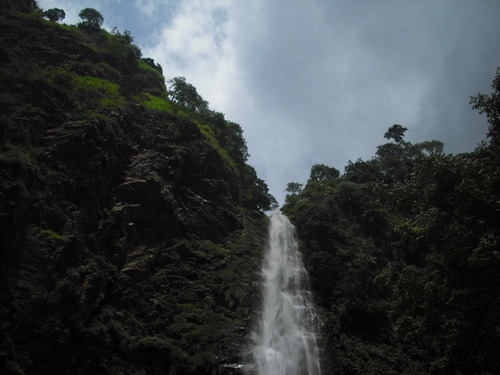
My journalism professors will be happy to know that the first thing I did (starting on the plane ride here!) was collect the entire group’s email addresses to add to a google spreadsheet. I now have a comprehensive list of most of my friends’ phone numbers, blog URLs (which can be found in one of the subsections in the margin), facebook pages and even a shared Flickr account for everyone to upload pictures.
Though not everyone is used to Flickr or Google docs, and the internet is pretty slow everywhere except the International Programs Office (IPO) and I’ll probably have to sit down with everyone one by one and help them upload, SUPER WORTH IT! Thank you to my multi-media journalism education for the aggregation capabilities.

And now some baby animal pictures.
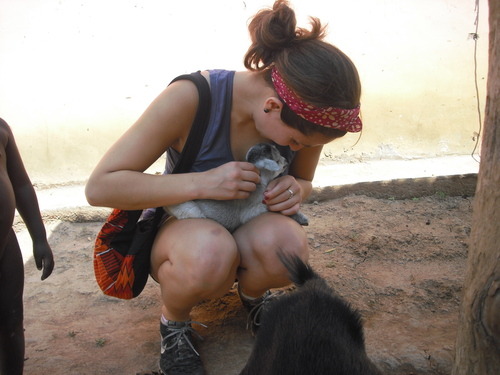
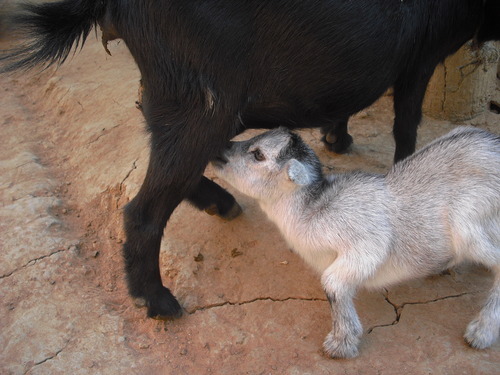
And without further ado, I attended a beach party about an hour away from Accra at a place called Krokrobite and was taped for a promo video. I thought it was just a silly video, but people from all over the place have recognized my face from it!
Next blog, I’ll talk about:
(walk well)
- Cultural adjustments, stigmas, acclimations and revelations
- All the pretty, pretty nature!
- Beach rave! (or just a regular old party on the beach)

And so the journey has begun. I’ve sent out group emails, recorded more audio than I can ever synthesize into stories (though that won’t stop me from trying— Transom, where you at?), hiked through the North, braved the bustling and aromatic streets of the Madina Market, visited schools, learned the special snappy handshake (video tutorial to come), experienced my first political protest (the Supreme Court verdict on the questionable election results) and finally started classes.
The road is long and it has just begun but I’m relishing in the experience, drinking in each moment and insatiably seeking out the next adventure. I can feel the gravity that this place has on me, it’s a deep aching tug on my heart that feels like meeting an old friend for the first time in many years. I’ve built friendships with Ghanaians that I know will last forever despite distance or time.

Photo: Hiking up to the Wli Waterfalls in the Volta region.
Acclimating and communicating:
Here are a few of the things I’ve heard from people back home both before and after departure to Ghana that are either unsettling or sound plain absurd upon arriving here.
- "Stay safe!"
- "Here’s a tip: Get a gun and learn how to use it."
- "Aren’t you scared?"
- "You’re going to be so tan/skinny!"
First: I’m safe. It’s very safe here. I have never worried about getting robbed, singled out (other than for marriage proposals), harassed or really harmed in any way. This is mostly because I take basic precautions like not being out alone in the middle of the night, making sure I’m with people I trust, being assertive about saying no (really, don’t be shy if you’re not comfortable) and being conscious of where my bag/money is. These are basic precautions for anywhere that you live. Crime and theft is looked down upon here and if someone tries to steal something and are caught, they’re usually pretty severely beaten by store owners, pedestrians, mothers, old ladies with canes etc. until the police come to save them. That’s right, a thief would rather be in jail than be caught on the street. The idea that I, a pedestrian/student should buy an Uzi and strap it to my back is and would be laughable. I’m sure many people would openly poke fun at my paranoia. So I’m not scared, nor have I ever been during my time here (honest!) and I am very happy.
Second: The tan skinny thing just feels a little strange for a few reasons. Those who subscribe to the Vogue/Seventeen magazine, popular culture, American idea of beauty— either consciously or subconsciously— are likely to cook up this odd compliment/prediction because it’s the only thing they can think of to be excited for me about (deep breath) BECAUSE they don’t know much about Africa or Ghana. Ghanaians would laugh the way an African American would laugh if the subject of tanning came up. It’s like discussing the weather, “It’s hot out today, the sun is shining..” Well, DUH!! I’m in Sub Saharan Africa! It’s hot! So yes, as an obruni (foreigner) my skin will get a little darker, but there’s no real social significance to that. Even if I were Latina, Chinese, Lebanese or Thai, I’d still be considered a white person here. It’s just the way things are. There’s also nothing special about being skinny— UNLESS you’re a model. That’s the only instance I’ve heard of it being discussed. Being larger or being called “fat” is actually a compliment. It’s a good thing here. The UC program coordinator, Dr. Rose Walls mentioned specifically that “all shapes and sizes are accepted here.” It’s really a beautiful thing, actually. Things that DO matter aesthetically: hair. Is it braided? Relaxed? Straightened? Curled? Long? Short? Do you have extensions? Did you add color? Honestly I’m tempted to try the braids just out of curiosity, but obrunis with braids are kind of laughable. It would be like if the first thing I’d done here was start wearing all rasta colors, dread my hair and start calling everyone Jah Spirit. Rasta is a big deal here for some and it’s kind of a hyperbolized example of “trying too hard” to fit in.
Clothing and style is also a big deal here. Everyone with the means dresses to the NINES out here. Beautiful, vibrant colors, traditional dresses, scarves, jewelry, shoes— holy crap why do people tell you NOT to bring nice clothes here? The club scene is especially striking. Platform heels, bottle service, tight tube dresses and other fashionable items that would put most of San Francisco clubs to shame. Why does no one talk about this?? Stigmas are an issue!

By the way, here’s a picture of me with Chimamanda Ngozi Adichie— I just started her newest book (the one she’s signing for me) Americanah and it’s ROCKING MY WORLD. I love her. Read her books. Yes I am shamelessly promoting her.
There’s been an ongoing debate on what constitutes a “developed” nation. In America, it’s technology, government infrastructure, efficiency and accessibility. Here the standards are a little different. Though there’s little in terms of organization, people don’t value those kinds of things. And I’m not really sure the implementation of them would be as effective as just strengthening the institutions that are already in place on a smaller individual scale.
For example: Ghana has an incredible abundance of natural resources. This country is stacked with goods like gold, coffee, rice, lumber, minerals and cocoa. The problem is that, like many “developing” nations, they don’t have the resources to process the raw materials that they grow. So a lot of goods are shipped to European countries for low prices and then sold back to Ghana at triple the price.
Why don’t they have processing plants? Because Western powers have monopolized their trade for almost 100 years and prevented any progress on this front.
However, if you want to start a movement, if your family is hungry, if you need somewhere to stay, if someone in your family is ill— etc. you can rely upon your family and expansive network of friends to talk to their respective network of friends and find a solution or get things moving. Everyone is family here. It’s customary to refer to those who are older than you as Auntie or Uncle and those around the same age as Brother or Sister. I have a very big family here.
The culture shock, oddly enough, hasn’t really hit me and I’m pretty sure it’s because I’m a naturally open, curious and talkative person (a mentality that flows with the culture).

There are some things that I never thought I’d get used to when I arrived, but have found temporarily surprising/funny/strange and moved on with my life:
- Religious sayings— ”except God” has been the funniest one because of the homonym. They’re on on all the cabs, tro tros (public transit), doorways and even mixed into the tribal language. Religion is a BIG DEAL here.
- Hand shake with the snap— it’s not a secret handshake, it’s just how people, mostly men and foreigners, say hi to each other. You shake and then snap your middle fingers as you release grasp. Tutorial video to come?
- Dogs, chickens, goats, cats, pigs roaming the streets— it’s not that they don’t have owners per se, it’s just that the owners don’t really care what they do during the day.
- Bustling city streets inundated with venders— all the time, everywhere, people calling at you “Obruni! Come here!”— nice segue-way to the next one…
- Being called obruni— at first I really hated it. I’m already physically different from everyone and usually in the states differences are pointed out like that because differences are bad. I didn’t realize I had that perception until I started feeling bothered by it. But no one who says it means me ill. In fact kids become bashful and smile as they say it. Most people are thrilled to welcome me to their country and just want me to have a good time. This kind of welcome feeling is not something I’m used to… but I could get used to it.
- People laughing at me when I speak Twi— I’m taking the language as a required class and have picked up some key phrases and courtesies. However, it doesn’t matter how good my pronunciation is, people laugh at everything I say simply because it sounds funny coming out of my mouth as a foreigner. Maybe this will change. We’ll see (grabs Twi notes to study viciously).
- The vast and lush jungles— they are everywhere and they are life and they are beauty. I feel like I’m living in the Lion King sometimes because of how gorgeous the rainforests and plains are. I have been left agape at the sights, sounds and smells of the natural beauty here.
- People carrying things on their heads— men, women and children alike use their noggins to carry around heavy things. And they do it casually, with ease and usually without the use of a supporting hand. Should I start doing that with my school bag? They usually have a little rag rolled up as a buffer between their heads and the object, but it’s really impressive and I want to learn!
- Men, women and children begging for money— just as they are skilled at carrying things, they make assumptions about my wealth. Comparatively, I am wealthy. I have a lot here. I may be a poor student living with my parents at home, but here where the exchange rate is 2 to 1, I’m a rich lady. But I have a limited amount of resources for the time while I’m here so I have to be careful about spending.
- People walking through traffic to sell goods— they sell things like shampoo, phone credit, children’s toys, food etc. One time I even bought mushrooms from someone walking through traffic for my stir-fry. It was delicious. Is it dangerous? It certainly looks that way, but I have yet to see anyone get hit and I always see people buy things, so it must be a viable business tactic.
- Unfinished buildings everywhere— for many people building houses, it’s actually cheaper to build slow. They pay for labor costs and development of the land and by the time the house is finished they own the land and the house. No mortgage (I need to verify this) no hassle.
- Cold showers— unless I boil water and mix it with cold water and then dump it over my head, the shower water is cold. All day, every day. I don’t mind it too much, actually. It does a great job of waking me up in the mornings and it feels great on hot days.
- Mosquitos and bug bites— They’re so sneaky you rarely see or feel it happen. Most of the bites are on my feet and ankles and the spots tend to linger. I’ve stopped wearing bug spray (it smells disgusting) and have been trying to make neem tea drinking a regular thing. Neem has all kinds of good health benefits, but it tastes pretty gross. So here’s hoping I get used to it.
- The heat— when I first got off the plane, I was struck by the heat. But pretty much from the third week on, I haven’t really minded it (granted it’s winter here right now)
- The friendliness of everyone— Courtesies aren’t just said as a way to get from the door to the car without being rude. People want to know how you are, where you’re going, how your day is, and even what day of the week you were born on. This mentality of caring fosters expedient friendship-building. If you give your number out, they will call you. Day or night. Not necessarily because they want to date you, but just because they want to be your friend and see how you are.

My journalism professors will be happy to know that the first thing I did (starting on the plane ride here!) was collect the entire group’s email addresses to add to a google spreadsheet. I now have a comprehensive list of most of my friends’ phone numbers, blog URLs (which can be found in one of the subsections in the margin), facebook pages and even a shared Flickr account for everyone to upload pictures.
Though not everyone is used to Flickr or Google docs, and the internet is pretty slow everywhere except the International Programs Office (IPO) and I’ll probably have to sit down with everyone one by one and help them upload, SUPER WORTH IT! Thank you to my multi-media journalism education for the aggregation capabilities.

And now some baby animal pictures.


And without further ado, I attended a beach party about an hour away from Accra at a place called Krokrobite and was taped for a promo video. I thought it was just a silly video, but people from all over the place have recognized my face from it!
Next blog, I’ll talk about:
- A Ghanaian wedding!
- Breaking into the radio scene
- Class structures
- And dorm life!
(walk well)
This post was taken from Lisa Carmack's blog http://lisawriteshome.tumblr.com/post/61408008298/we-live-together-we-learn-together



Comments
Post a Comment